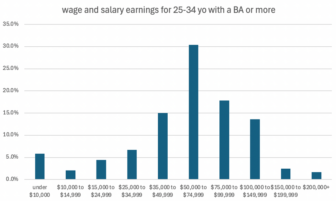As we detail in our new report, ![]() A path to good-paying careers for all Michiganders, if Michigan is going to be a place with a broad middle class, if employers are going to have the supply of skilled workers they need and if Michigan is going to be a place once again where kids regularly do better than their parents, it will happen because the state made a commitment to provide an education system for all from birth through higher education that builds rigorous broad skills that are the foundation of successful forty-year careers.
A path to good-paying careers for all Michiganders, if Michigan is going to be a place with a broad middle class, if employers are going to have the supply of skilled workers they need and if Michigan is going to be a place once again where kids regularly do better than their parents, it will happen because the state made a commitment to provide an education system for all from birth through higher education that builds rigorous broad skills that are the foundation of successful forty-year careers.
A lifelong education system designed around the 6Cs (collaboration; communication; content; critical thinking; creativity; and confidence) as foundation skills for all no matter what career one chooses requires a transformation in our approach to human capital development. What follows are the areas in which transformation needs to happen. It is written mainly from the perspective of K-12 education, but a similar transformation is needed in all our education institutions.
- Standards: From an almost exclusive focus on content to Common Core content standards plus rigorous standards for the five other Cs.
- Assessments: From one right answer standardized tests to measures that are predictive of college and career success. In addition to not being predictive, having standardized test scores as the only measure of student success has driven out of most schools serving non-affluent students the arts, music, a rich array of electives and free extracurriculars all important elements in building the 6Cs.
- Pedagogy: From rote learning to problem solving/project based teaching and learning.
- Accountability: From closing low performing schools to holding management of education institutions and systems at all levels accountable for high-bar standards of student success at the next level.
- Talent: From far too many blaming teachers to valuing, developing and holding accountable all professionals who impact student outcomes. This is teachers, but also principals, counselors, superintendents and chief academic officers.
- Funding: Substantially increasing funding for non-affluent children from birth through college. To us the evidence is clear: The formula for ending what is increasingly becoming an education caste system––where for the first time in American history your parents’ education attainment is the best predictor of a child’s education attainment––is both far higher quality education providers and substantially more funding for children growing up in non-affluent households starting from birth through college. As Robert Putnam makes clear in his book Our Kids, if you want evidence that investment in education matters just take a look at how much top quartile parents spend on their kids development from birth through college.
- Segregation: Incentives to integrate neighborhoods and schools by race and class. We have known for more than a half century that the most powerful lever to improving outcomes of non-affluent students is attending school with lots of middle class students and yet we are going in the wrong direction.
- Operators: From letting the market decide who operates schools to giving parents choice but only from operators who meet high quality standards and where supply and demand is balanced. We are long-time supporters of charter schools and school choice, but have been disappointed in the results of both. States where choice is working best to improve student outcomes combine increased parental choice with much higher quality bars to be able to operate schools.







